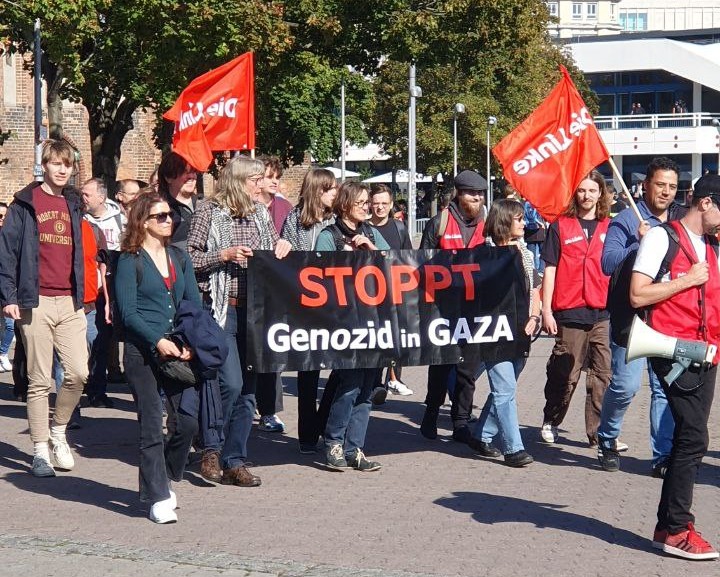Last Sunday, May 28, many parts of Spain held regional elections alongside municipal elections (about 8,000 municipalities and 3,000 minor local entities).
It is 12 o’clock in the morning and I sit as representative of Izquierda Unida — Podemos in my local polling station in the center of Palencia, a city of 80,000 inhabitants in so-called “Empty Spain”, in Castilla y León. It’s time to leave 11 o’clock mass. Now, many people will arrive to vote. The same thing happened coming out of 10 o’clock mass. The city centers are dominated by conservative voters in Castilla. Here, we have few votes to win for the left-wing parties.
At 8:00 p.m. the voting ends and the counting begins: “Partido Popular, Partido Popular, VOX, Partido Popular, Vamos Palencia (businessmen’s candidate)”, etc. Not bad after all, 4% for Izquierda Unida — Podemos at this polling station. I leave the polling station, go to the headquarters of Izquierda Unida Palencia and wait for better news from the suburbs.
It’s not coming through. “In the neighborhoods they are voting for us much less,” says one comrade. She comes from the neighborhood of Pan y Guindas, where many low-income working people live, where our results were supposed to be good. “At one polling station, 7 votes”. “But in the center there were 21!” I say. “They didn’t come to vote,” she answers.
This situation seems to be part of the problem of the regional and municipal elections in much of the country. The results have led to the loss of left-wing coalition governments or PSOE (social democrat) governments in Aragón, País Valencià, Extremadura, La Rioja, the Balearic Islands and the Canary Islands. Only in Navarra, Asturias and Castilla — La Mancha are left-wing governments still viable. The same in the big cities. In Barcelona, Ada Colau and Comuns became the third party (very close to Junts, right-wing nationalists and the PSC, PSOE’s Catalan equivalent), in Valencia the right-wing will govern. The same in Seville, Cadiz, Cordoba, Zaragoza and Valladolid. The map is tinged blue for PP (conservatives) and green for VOX (extreme right). In Madrid, the PP obtained an absolute majority in the capital of Spain and in the Madrilenian regional elections.
Within the left, few joys. Basque left-wing pro-independence (Bildu) and Galician left-wing nationalists (BNG) improved their results. Also slight gains by the left-wing regionalists of Aragon (CHA) and Madrid (MM), especially at the municipal level. The coalitions of Izquierda Unida and Podemos (with different names) are left out of the Madrid City Council and the Madrid Assembly, as well as the Valencia City Council and the Parliament of the Canary Islands. In the Balearic Islands we almost disappeared completely, and the results remained consistent with the past only in Extremadura, Navarra, La Rioja and Murcia.
In the case of the places where Izquierda Unida and Podemos have run separately, the results are disparate. In Asturias, Podemos drops from 4 deputies to 1, while Izquierda Unida rises from 2 to 3. In Aragón, Podemos drops from 5 to 1 deputies, while Izquierda Unida keeps 1 deputy. For its part, Izquierda Unida loses part of its voters, but keeps its most famous mayorships: Rivas in Madrid which, unless there is a surprise in the second recount in Barcelona, will be the largest city with a left-wing mayoress; and Zamora in Castilla y León, the only provincial capital governed by the left. Sanlúcar de Barrameda in Cádiz is a surprise addition.
The case of the division of the left is paradigmatic in Andalusia, where the anti-capitalists of Teresa Rodriguez presented themselves separately, and where Podemos broke up coalitions at the last minute like in Cadiz. Rodriguez’s party got 8 councilors, Podemos did not reach 30, while Izquierda Unida received 803 councilors and around 100 possible mayorships. The map is similar in other parts of Spain, especially in cases such as Asturias.
This tour through the geography of Spain and the results at the regional and municipal level seems necessary for me to jump to the next point. The day after the regional and municipal elections, the President of the Government, Pedro Sánchez (PSOE), who governs in coalition with Unidas Podemos, called general elections.
His decision was based on three pillars: the first, to avoid six more months of government erosion before the elections that should have been held in December; the second, to silence the results of the municipal and regional elections through the shock doctrine; the third, to try to crush the left-wing parties, which have been focused on reconfiguring themselves for the last few months.
Recently the Minister of Labor, Yolanda Diaz (with a Communist Party card), founded the space “Sumar”, to unite a left-wing front. The launching of “Sumar” was backed by Izquierda Unida, the Communist Party of Spain, the left regionalists of Madrid, Valencia and Aragon, Equo-Los Verdes, Alianza Verde and some other smaller parties. Podemos did not attend the launch and, after the May 28 elections, long negotiations were expected to try to unite the entire left.
The sum of the regional and municipal elections, in addition to the call for general elections on July 23, means the left only has a week to decide whether to create a united front or not. The last big stronghold of Podemos, both politically and economically, is its large parliamentary group in the Congress of Deputies, where it has the majority of the deputies of Unidas Podemos. However, that group was founded on the results of the 2019 regional and municipal elections, when Podemos negotiated in a position of strength with respect to the rest of allies.
The May 28 elections made it clear that the situation has changed. However, from some perspectives Sumar is a betrayal of Podemos, which is still the main left-wing force in the country. This is fed especially by Pablo Iglesias from his TV channel “Canal Red” and his podcast “La Base”. It is true that Podemos was the main left-wing force. It is doubtful that they still are. Negotiations cannot be done on the same terms as 2016 and 2019. It must be taken into account that in Sumar there are also Podemos splinter groups. The paradigmatic case is that of Más Madrid, founded by the former number 2 of Podemos, Íñigo Errejón. These days there is much talk of “betrayal” and “revenge”, an unflattering scenario for building a broad front of the left.
It would be a mistake if Podemos did not consider its new situation for the configuration of the left-wing alliance and attempted to maintain itself as the head of the coalition, but it would also be a serious mistake if the rest of the left-wing forces sought to “punish” or “humiliate” Podemos. That is what Pedro Sánchez wants, in part, by calling early general elections: to force either the suicide of the left if it goes separately, or to force hasty negotiations that would leave many people dissatisfied.
Sumar, a space made up of communists, social democrats dissatisfied with the PSOE, as well as ecosocialists and regionalists, requires a minimum program where each party also has its own room for maneuver. The fundamental pillars would be the defense of workers’ rights, stopping the ecological crisis, expanding peace policies and international solidarity, deepening the rights of women and LGTBIQA+ people, as well as mitigating the effects of the market with limitations on food, energy and housing prices. Republicanism and federalism as well. It will not be a communist program, but it will be a program to win the cultural battle against the current reactionary wave, which goes beyond the previous neoliberal wave. While neoliberalism tried to crush the rights achieved, the reactionaries now want to deny the right to exist of many people, mainly women, LGTBIQA+ people, migrants and poor people.
It is a temporary electoral program and, as such, it must remain temporary. The socialist and communist parties within Sumar have to continue developing their own agenda beyond parliamentary work. If not, in the long run, we have lost the battle. It is an electoral program to defend rights, but we must go on the offensive, because both social inequalities and the climate crisis require it. Elections are a means and not an end, so it would be a mistake to settle for getting a good electoral result. It is about transforming society, not about winning elections. For this, we need joy to fight and organization to win.




